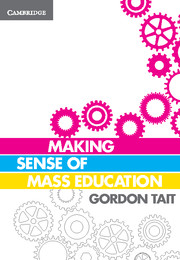Book contents
- Frontmatter
- Contents
- Acknowledgements
- INTRODUCTION
- PART 1 RE-ASSESSING THE THREE PILLARS: MODERN AND POSTMODERN SOCIOLOGIES OF EDUCATION
- PART 2 THE FOUNDATIONS OF AN ALTERNATIVE APPROACH: EDUCATION AND GOVERNANCE
- PART 3 CULTURAL CONTEXTS OF CONTEMPORARY EDUCATION
- PART 4 PHILOSOPHY AND MASS EDUCATION
- CHAPTER 10 PHILOSOPHY
- CHAPTER 11 ETHICS AND THE LAW
- CHAPTER 12 TRUTH AND POSTCOLONIALISM
- CONCLUSION
- References
- Index
CHAPTER 12 - TRUTH AND POSTCOLONIALISM
from PART 4 - PHILOSOPHY AND MASS EDUCATION
- Frontmatter
- Contents
- Acknowledgements
- INTRODUCTION
- PART 1 RE-ASSESSING THE THREE PILLARS: MODERN AND POSTMODERN SOCIOLOGIES OF EDUCATION
- PART 2 THE FOUNDATIONS OF AN ALTERNATIVE APPROACH: EDUCATION AND GOVERNANCE
- PART 3 CULTURAL CONTEXTS OF CONTEMPORARY EDUCATION
- PART 4 PHILOSOPHY AND MASS EDUCATION
- CHAPTER 10 PHILOSOPHY
- CHAPTER 11 ETHICS AND THE LAW
- CHAPTER 12 TRUTH AND POSTCOLONIALISM
- CONCLUSION
- References
- Index
Summary
This chapter argues that the issue of ‘truth’ has played a foundational role, not only within the discipline of philosophy, but also within many different aspects of our culture. However, there seems to be little agreement on what it really is, and while some philosophers contend that truth is a meaningless concept – a linguistic mirage – most would argue there's something of importance there, but what is it?
Even if we struggle to determine the real nature of truth – as we did with the real nature of right and wrong in Chapter 11 – at least we structure our culture, our knowledges, and our school curricula around stuff we know to be unequivocally true … or do we? Arguably, many of the assumptions we make, often derived from five centuries of European colonialism, do not stand up to close scrutiny. They are often ‘truths’ that suit particular interests of the powerful, and subtly act to reinforce their world view.
Myth #1 ‘Truth’ is the most straightforward thing there is
Truth is simple. Certain things about the world are ‘facts’. If we report them accurately, we are telling the truth; if we don't, we aren't. That's all there is to it.
Actually, no it isn't. Philosophers have been debating the notion of truth for over 2500 years, debates that have resulted in very different approaches to this issue, most frequently divided into realist and anti-realist models. These models in turn generate different kinds of truth tests, which can be applied to given problems and statements. All in all, ascertaining what is true, and what is not – in the curriculum, or elsewhere – remains a complex and contested process.
- Type
- Chapter
- Information
- Making Sense of Mass Education , pp. 254 - 274Publisher: Cambridge University PressPrint publication year: 2012



